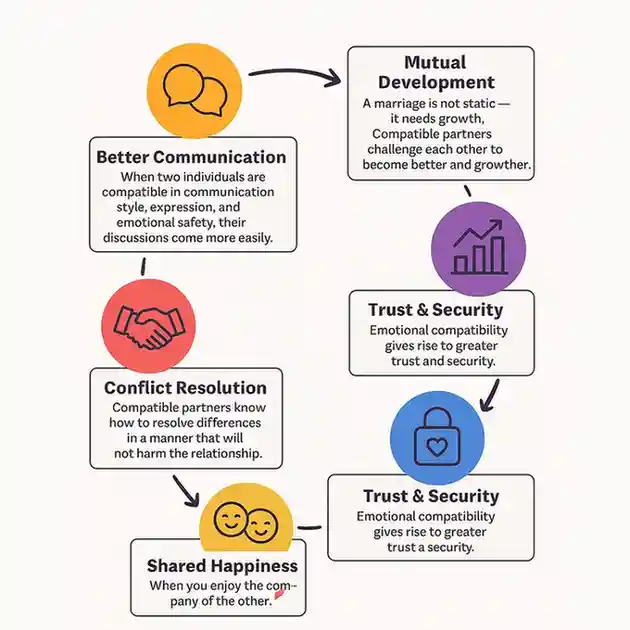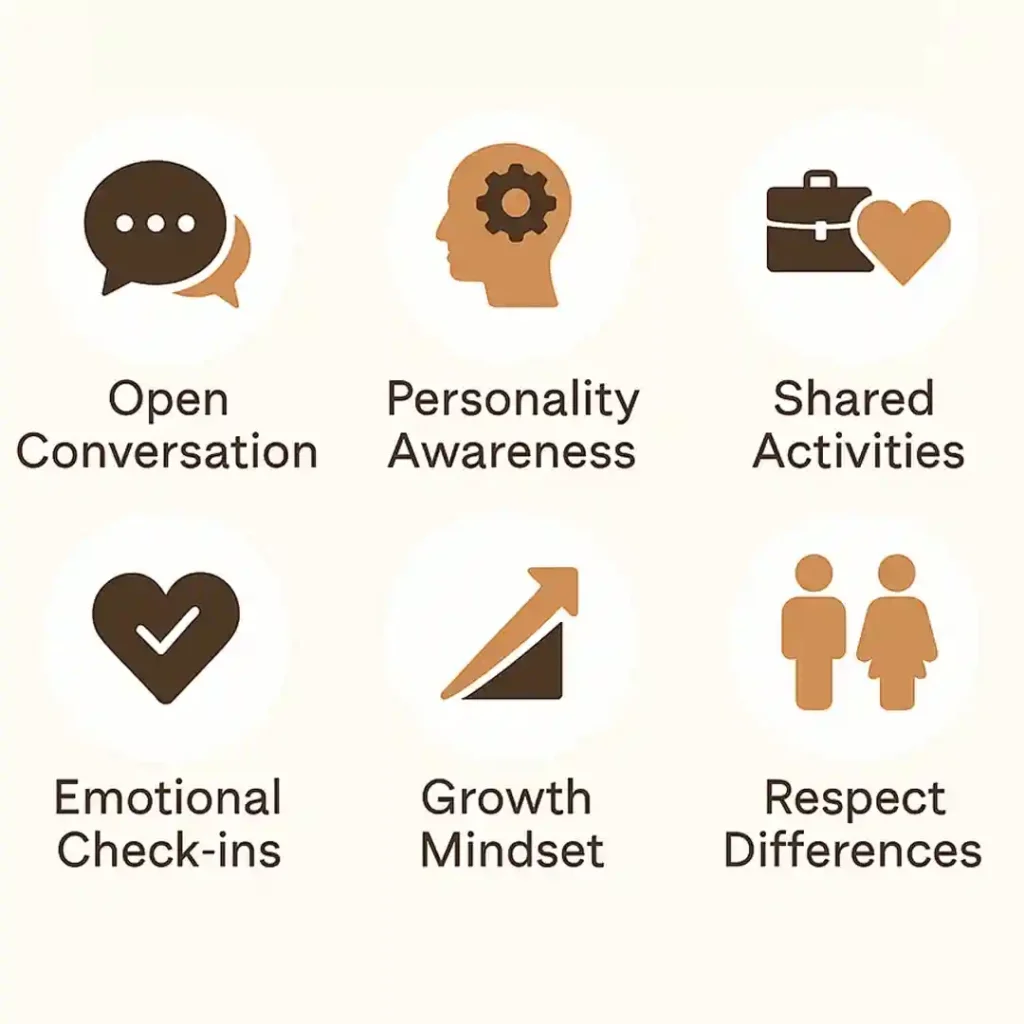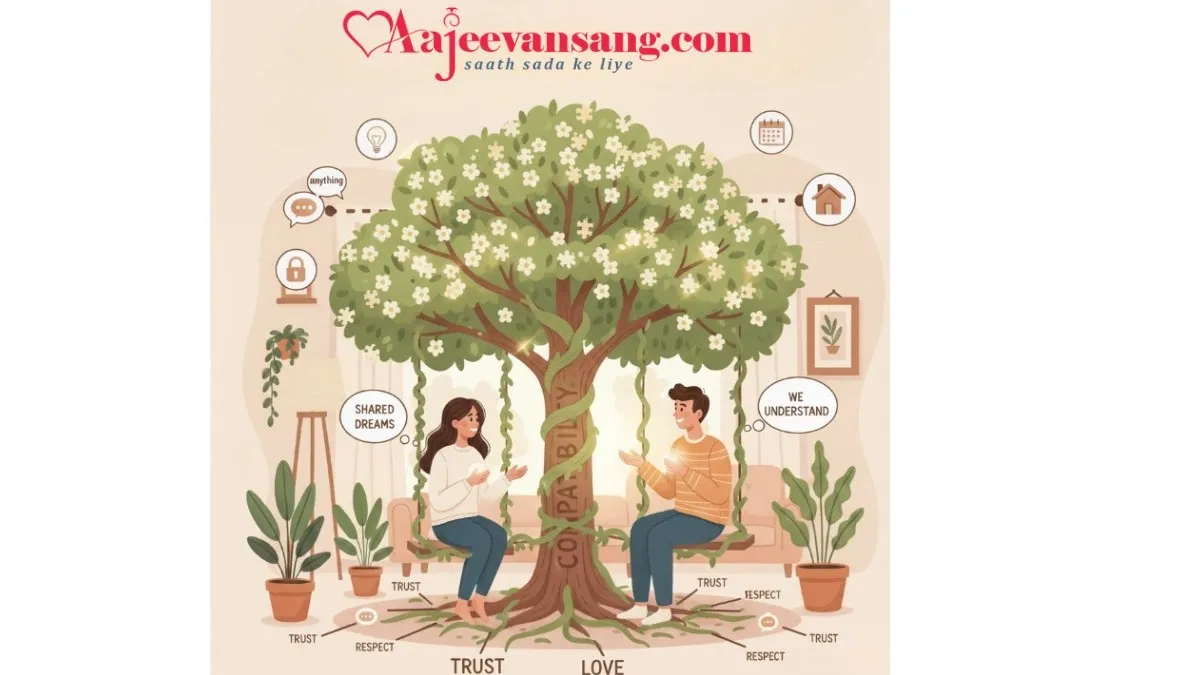Compatibility in Marriage: Marriage is not merely love, chemistry, or family planning. In the long term, what holds a relationship together isn’t always attraction or societal pressure — it’s compatibility. Marital compatibility gives a couple the confidence that two people can coexist peacefully, resolve disagreements with maturity, and develop jointly emotionally, spiritually, and practically.
In the modern era, more and more people agree that compatibility is more important than temporary chemistry. Actually:
- 83% of urban Indians express that compatibility and shared interests are more important than looks or family background in selecting a life partner. The Indian Express
- Contemporary thinkers advise that compatibility vs. chemistry is not an either-or; balance and alignment are important.
In this article, we’ll delve into how compatibility in marriage works, why it is important, how it can be developed, and answer your biggest questions in the process.
Table of Contents
What Do We Mean by “Compatibility in Marriage”?
“Compatibility” is confused with having all the same things, but it is not so simple. It’s really about:
- Shared values, life vision, and goals
- Emotional compatibility (how you react, sympathize, support)
- Communication style and conflict resolution style
- Lifestyle, priorities, hobbies, and aspirations
Compatibility means you feel safe to be yourself—you can be vulnerable, disagree, and feel accepted anyway.
It is not no differences but differences that are manageable, respectful, and negotiable so that the relationship is stable and nourishing.
The Key Pillars: How Compatibility Builds a Stronger Marriage

Let’s get into the five key ways compatibility is the glue of a healthy marriage:
Better Communication
When two individuals are compatible in communication style, expression, and emotional safety, their discussions come more easily. They don’t feel as misunderstood or defensive.
Conflict Resolution
Committed partners know how to resolve differences in a manner that will not harm the relationship. They’re more inclined to compromise, learn about each other’s hot buttons, and reach constructive solutions.
Mutual Development
A marriage is not static — it needs growth. Compatible partners challenge each other to become better, encourage dreams, learn from each other, and grow together.
Trust & Security
Emotional compatibility gives rise to greater trust and security. You are less suspicious, less nervous, more secure. When you understand your partner “gets” you, you feel safe.
Shared Happiness
When you enjoy the company of the other, little things matter. The pleasures of shared interests, laughter, and emotional security enhance the texture of life.
These five are a cycle—as trust increases, communication becomes better; as communication becomes better, conflict becomes more easily resolved, which leads to mutual growth, further supporting trust and happiness.
Compatibility vs. Love vs. Chemistry
It’s important to know how compatibility differs from (and supplements) love and chemistry:
- Chemistry is the first spark: attraction, excitement, and emotional high. But chemistry by itself can dissipate or become confusing if there is no substance behind it.
- Love is the emotional connection, care, affection, and attachment.
- Compatibility is the structural foundation—mindsets, values, alignment, and habits that keep the relationship intact past the initial honeymoon period dissipation.
- Most relationship experts warn that emphasis on chemistry may result in instability. Compatibility makes sure that the foundations are solid enough when adversity hits.
Traits & Signs of Compatibility
These are generally accepted traits and early signs that indicate compatibility in a relationship:
- Shared values (morals, religion, family)
- Emotional safety—you can be vulnerable
- Respect for each other’s autonomy
- Good conflict style—not avoidant, not explosive
Similar life goals/direction
- Trust and respect for one another
- Support for personal development of one another
- Routine alignment (daily habits, work-life balance)
- Open and honest communication
These characteristics are most frequently referenced in relationship literature and research.
When couples check many of these boxes, they’re much more likely to maintain a marriage.
How to Build and Cultivate Compatibility

Compatibility isn’t always 100% from the beginning—it can be developed over time with effort:
- Early open conversation—talk expectations, values, and vision.
- Personality awareness—understand how your partner thinks, manages stress, and makes decisions.
- Shared activities—spend time engaging in activities together (traveling, projects, interests).
- Growth mindset—be open to change, adjusting, and growing together.
- Emotional check-ins—have frequent conversations about how things are going, concerns, and adaptations.
- Respect differences—understand that every individual has different qualities and work with them with compassion.
These steps assist you in transforming from “compatible enough” to highly aligned over time.
Why Compatibility Is Particularly Relevant in the India/UP Setting
In cultural settings such as Uttar Pradesh and much of India:
- Families and communities tend to have strong expectations, so external pressures are high.
- Arranged/semi-arranged marriage arrangements still depend on family approval, so emotional compatibility is even more critical for the couple’s long-term happiness.
- In online surveys, an overwhelming percentage of Indian youth indicate that compatibility and common interest are high priorities above looks or family background. The Indian Express
- Age-old methods such as horoscope matching (kundli matching) remain dominant in the majority of Indian marriages. These tend to seek to improve compatibility (spiritual, emotional, and familial).
- So, for players like Aajeevansang working in UP/Lucknow, emphasizing compatibility (culturally rooted + contemporary) can be a strong USP.
How a Matrimonial Platform Can Assist in Ascertaining Compatibility
A platform such as Aajeevansang can contribute significantly:
- Compatibility filters—on the basis of education, lifestyle, values, and ambitions.
- Personality/psychometric tests to identify deeper alignment.
- Verified profiles to ascertain trustworthiness and minimize misrepresentation.
- Family-inclusive matching so that both families sense compatibility.
- Safeguards & transparency so users trust the matches and process.
When a matchmaking site incorporates compatibility in its foundation, it gains credibility and long-term involvement.
FAQs (Frequently Asked Questions)
Q1: Is compatibility greater than chemistry?
A: Both are crucial. Chemistry makes two individuals interested, but compatibility maintains the relationship. Without compatibility, chemistry alone tends to fizzle or create tensions.
Q2: Are two highly different personalities compatible?
A: Yes—provided they value each other’s differences, are great communicators, and share core values and growth mindset. Differences are complementary if handled maturely.
Q3: What if compatibility is low in one sphere (e.g., finances)?
A: Doesn’t mean doom. The solution lies in acknowledgment, open communication, willingness to work on it, and support each other in weakness.
Q4: How long does it take to know if two people are truly compatible?
A: It can start to become evident within months (6–12), but compatibility deepens as partners face life’s ups and downs together. Real-world challenges are the true test.
Q5: How can matrimonial sites measure compatibility?
A: Through filters (education, interests, background), questionnaires/assessments, behavioral metrics (communication style), and feedback loops.
Conclusion:
Compatibility is the quiet driving force of a happy marriage. It’s not showy, but it’s vital. Love and chemistry provide the oomph for relationships, but compatibility is what lays out the map for day-to-day life: how you communicate, work through differences, grow, learn to trust each other, and enjoy life together.
If you’re navigating matrimonial platforms, focus on compatibility filters, authentic profiles, and platforms that understand this deeper side of relationships. For those using Aajeevansang, this is one reason why it can stand out—by emphasizing compatibility over superficial traits.


